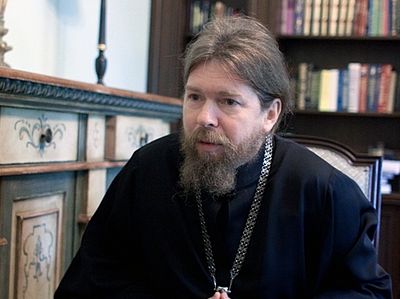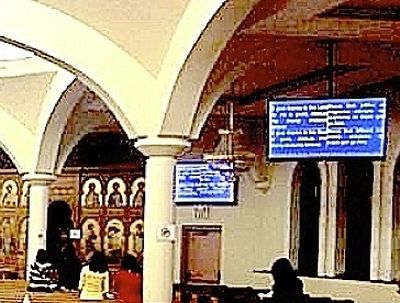
—Your Eminence, you are the Chairman of the Commission of the Inter-Council Presence on Church Law. Everyone likes to talk about their rights these days, but they forget about their responsibilities. What duties do we have first of all?
—We have one duty, to be Orthodox Christians, every day, not only on Saturday and Sunday . Every single hour. We must confess our faith everywhere throughout the length of our lives.
—Different periods of time are distinct from each other. What is characteristic of our day? In your opinion, what are the most serious challenges facing Christians today?
—First of all I would say problems with rearing young people. Today a great deal of un-Orthodox things invade our lives, an anti-Christian spirit, with which every child already comes into contact in his first years of life. The Church and parents of course must protect their children from this. Not only protect them, which is insufficient, they must be given something positive instead. From the very earliest of years, children must participate in the Mysteries of the church, so that they would recognize their specialness.
We Christians are not of this world. We must not adapt to it. Yes we live in this world, but we have one duty, to be Orthodox Christians. We live according to our customs, our rules. Our children are faced with resisting this world even as school children, especially in the West, where there may be only one Orthodox Christian child in school. Naturally he must defend his positions. But for this he must understand his exceptional quality, is uniqueness. He must know that a Christian cannot behave like everyone else, think like everyone else, act like everyone else he knows in school. He must understand the value of his faith, he must know that he has something special that others do not. For participating in the Mysteries raises him above the common man.
Even the schedule of his daily life, beginning with morning prayers and ending with evening prayers, is different than that of his friends. When a child recognizes this, he can live peacefully. If he does not understand this, if he then he will be constantly under pressure, or he will the absorbed into the general mass of humanity. To do what everyone does, to go with the flow with other children, in any country, not only in the West. For an Orthodox Christian to submit to this is very dangerous, because it is easy to lose your identity. And only then will you understand what riches you possess, the Orthodox faith, the Orthodox Church tradition, and you will live your own life.
In the West, this situation is made more complicated by the range of choices, to be Russian or not Russian, to speak one another language, etc. So that life sets challenges to the young generation. It is important for him to know the correct answers.
Captivated by Gadgets
Today's technology make all events instantly accessible, even the personal lives of others. Each person has a video camera, mobile phone, and everything that is witnessed in real life immediately is posted on the internet. This involves the Church as well.
—We see how many videos there are of clergymen, their behavior, which maybe sometimes inappropriate. As a bishop, what advice would you offer, how do you react?
—What do you do, let us say, when you see something inappropriate that your priest has done? This has a great educational aspect for us. This is a reminder, that we must not forget the responsibilities we bear, how life for us should be one of constant ministry. We do not dare to succumb to passions or weaknesses, at every moment of our lives we must do without faith teaches us. Even before, priests were visible to all, so in essence nothing has changed, only the quality and quantity has.
If at one time, let's say, in some village, a less than exemplary priest was serving, then only his own parishioners knew this, whereas now a wider scope of society can see something unpleasant. A priest, and not only a priest, but any Christian, bears the duty for everyone for all, for his flock and for his fellow Christian. Not for a minute do we dare forget the conciliarity of our Church. And as conciliar Christians, we always have influence on everyone else. What one person does will be reflected on everyone else, both positive and negative.
Besides that of course we must constantly remind ourselves, and others, that individual episodes, events, taken out of context, cannot bear witness to the general attitude. For laypersons we must clearly say this is not a picture of our Church, this is one who has strayed. And every person can stray, this is human nature. If something happened inappropriate, we do not dare concentrate on this, let alone put him on a pedestal, we must always know that this is an error of a single individual. We shouldn't make too much of this. This applies to other facets of life, but especially if you live in the Church.
—Many people use telephones, smartphones and tablets in church, to read along with interpretations of the Epistles, the Gospels, or to read prayers before communion. What is your view of this?
—I came to the conclusion that we should not use such technology as a matter of principle. I used to read the mystical prayers on my smartphone, but another bishop once said to me, “You know, I keep thinking that you are sending and receiving text messages.” I put my phone in my pocket and decided I will no longer do that so as not to lead others into temptation.
Unfortunately even priests use phones in the altar, they make phone calls. I always ask them to step out of the altar when I see this. Of course, in extreme circumstances one might need to look at one's phone. I often travel to parishes, and in the altar the prayers are often read after the minor entrance. Sometimes I don't have the slip of paper with the prayer on it, which I usually prepare in advance, or maybe I chose the wrong kondakion, so I take out my phone. But this is rare. Again from experience I see that this leads others into temptation. I also know that if you do this often, it becomes habitual, and it becomes hard to break the habit. Modern technology certainly broadens our possibilities, but we should not rely on it exclusively, to replace our own memory, our own thoughts.
The Monastery and the World
—Your Eminence, the pressure of the world today is felt by everyone, even those who choose the monastic life. What challenges are the most serious?
—First of all it is the digitalization of the world and of mankind. Of course it makes life easier in many ways, but it also forces people to take upon themselves more responsibilities. They think, “Well, I have a computer, I can do my work quickly, so here are two more tasks I should take up”. A monk in this situation loses his foundation and is left without time for prayer. What are monastic obediences? They were always such that you could also pray at the same time. They wove baskets, tended to gardens--our monks, for instance, make candles. As they make candles, they pray.
At the type shop, it is harder to pray. The most difficult part is to prepare materials for publication, for this you need concentration of the mind, and it is difficult to pray. More experienced monks keep the prayer in their hearts. This is why I demand that monks who do such work, take breaks of a half hour in order to make 10 prostrations, recite the Jesus Prayer 25 times, and then return to work. I know through personal experience that this is very effective. Many fear tearing themselves away from work, they think they will be distracted, and will lose their train of thought. In fact it's the opposite. After prayer, you think more clearly, new ideas come to mind.
I used this method even while studying in college. Every half hour I took a break and a rose to prayer, and then my work went more smoothly than before. Of course for this you need inner discipline. Another challenge that allows our monks face is the need to have more contact with the external world. If a monastery is not in some remote location, but in a city or a suburb, there are many more temptations that stem from having contact with the world. Going to buy groceries, and tend to other matters. If a monk does not learn to properly address such matters, to prepare himself, to keep prayer, to avoid unnecessary distractions, then such contact with the world can be very problematic. Of course they must be regulated. They must be limited. This is very hard, but isn't it is necessary.
Also, access to computers and other gadgets must be limited. Under no circumstances should they be kept in one's monastic cell, only in an office. And another thing. People who come to visit monasteries bring their own worldly habits. The most common of these is to follow the news, current events. But a monk does not need this at all. The habit has taken such root within people today, that it is extremely hard work to root it out. Alas, I must say that I do not read the news every day. I know if something important happens, our parishioners will call me and tell me. If it is something truly important for us, then either I or a relative will relay it to our monks. But chasing after the latest news, so common in the world, must be excluded in the monastery, it hinders the work of a monk.
Another big problem is posed by relatives. Today it is much more difficult to resolve than before. Meetings with relatives must be limited, so that the monk does not immerse himself in this world, the world already easily invades the monastery, and one must be very vigilant not to succumb to it. Thank God there is Mount Athos, where one can truly live apart from the world. I think these are the main challenges that contemporary monasticism faces. Yes, disciplined obedience are very, very difficult. Before it was easy to submit to discipline, because obedience was commonplace in the family, instilled in children. Today this is not the case, and a person who enters a monastery from the world brings with him his own spirit of disobedience and pride--he must emancipate himself from a great deal of habits. Much inner will must be broken.
For instance, young monks find it difficult to rise very early for divine services. It was much easier before when young men completed military services, they became accustomed to rising early, so monastic life was no different. Now many do not serve in the military, and rising early is a big problem.
All monasteries face the problem of disobedience, this is a contemporary challenge. And self-will is a terrible thing. Purify your heart for prayer! One of the problems today is immoderate consumption. In order to consume any good, you need money, and if there is insufficient money, people use credit. Recently it became known that the people of Russia have borrowed an amount that would equal the entire budget of an average European nation! Living in debt leads to serious spiritual problems. Spiritual peace is disrupted, people think of nothing else but how to pay their interest. What do you make of this situation? I never used credit cards and don't want to. I always feared that I would be caught in a trap and would not know how to escape.
Of course our parishes are forced to borrow money, to pay for their church building, or other parish property. I think on that level this is alright. In personal life I cannot accept this because it takes away my independence. This is my personal approach, and I can't speak for everyone.
Returning to the education of children and youth, recently there has been much on TV and video games showing dissolution, perversion, lack of principle, and other negative things. And what can we say about such video games? What does this lead to, and what should parents think about? This leads to the devil! Those parents are wrong when they do not forbid such films and games. We cannot base our lives on what is forbidden. Children must be offered something to replace such shows and games. With such a foundation, they will come to discern what such films are good, good or bad. Such films and games fill the soul with filth. In the 1950’s-60’s, one American psychologist established that children have already experienced so much before even starting school that even their grandparents had only experienced in their entire lives. Children sit in front of the television.
When I would return from Mount Athos, after a two or three month visit, I would find a pile of newspapers on my desk, I would look at the last one and the first one, and they all contain the same thing. And none of this is necessary in my life. Every person must understand this clearly. I already spoke of how people are dependent upon the news today. I know people who watch the news four or five times a day. What is the use? If one goes to pray, for example reading one song, or 20 Jesus prayers, there is something useful. Read the prayers. Read the Psalter. If you are an adult, read the interpretations of the Psalms. Of course the Psalms is a very difficult book, but it infuses all of our divine services. It is useful to know every Psalm, learn it, see what the Holy Fathers wrote about them, and live by them.
This is the real world, not what is happening today in America or Africa, what business is it of ours? This only irritates us and fills us with useless information. All such useless information then takes on a life of its own in the human heart. It burdens it so that prayer becomes impossible. People come to a priest in tears and say "father, I can't pray!" The reason for this as a rule, is that his heart is overburdened and has no place for prayer. If you enter too much information into a computer, it will crash, it will cease to work. And the human heart, alas, does not crash, but when it is overburdened it simply cannot take it anymore, and this is harmful. I often tell people take just five minutes to do one thing and one thing alone. Then move on to something else. The rest of the time, just pray. This is a systematic approach to time management. Time is a talent, a gift we are given. We must work, as the parable of the talents says, we must exploit the talent. When we sit there and fill our hearts with news that is not needed, then we bury this talent.



